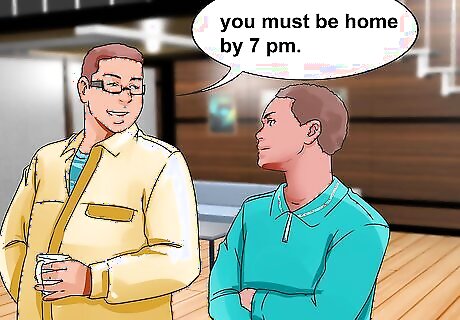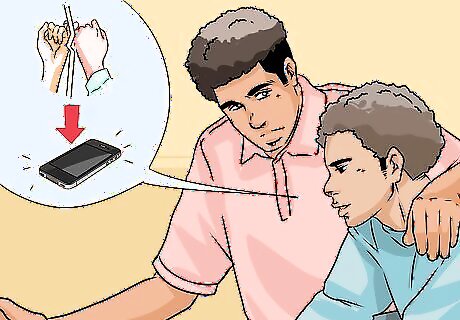
views

Define the boundaries before they are enforced. Teens need to know what is and is not appropriate behaviour before being held responsible for breaking a rule that they didn't know existed in the first place. If you say "Be home before 10 pm" make sure they know that this rule exists and what happens if they walk in at 12 pm. If you're going to punish them if they come in at 10:01, make sure they know. If you have a 30-minute grace period, let them know.

Don't be a dictator. When you’re setting rules and limits, involve your teen in the process. For example, if your 14-year-old wants to go to bed at 11 pm, but you would rather 10 pm, suggest 10:30 pm. A willingness to be flexible and negotiate with your kids will garner you more cooperative behaviour in the future

Take action If your child continues to break whatever rule(s) you have set, you need to take action. To maximize the chances of your next action working, fit the punishment to the crime if possible. Here are some sample actions that have punishments that are connected to the crime Let's say your Preteen is listening to explicit music. You would say "Sean, please don't listen to explicit music. If you continue to do so, you will have your Phone taken away from you.". This potential punishment is linked to the Violation Another Example is your Teen keeps leaving their bike outside. You would be right to say "Timmy, please stop leaving your bike outside. If I find it outside again, I will put it away and you will not be able to ride it for 2 days.". The threat of not being able to ride the bike will work more effectively than,for example, grounding, as it is linked to the crime A 3rd example is that your teen is watching potentially inappropriate films without Permission. You would say "Richard, please don't watch R rated films without adult supervision. If you continue to do so, your TV privileges will be taken away." Let's say your teen is refusing to study. You could say "Courtney, please go and study. If you fail tomorrows test, you will miss next weeks party so you can study.". Having to miss the party next week for studying will make it so the teen will study to pass the test so they can go to the party If it is not possible to link the Punishment Directly to the crime, such as in the case of Violence, the best course of action would be to remove Privileges and/or grounding

Make sure the Punishment is Appropriate. Overly harsh punishments are often not effective, as they typically cause the child to think more about how angry they are rather then thinking about what they did. Depending on the exact punishment, your child may also start to see it as the new 'normal'. Punishments that are too minimal are also not effective, as the child would barely be affected. You should start with a mild form of punishment and go to stricter punishments if earlier and less strict ones fail. For example, if removing your child's TV Privileges fails, ground your child the next time they do something against your rules. (If you want a picture, imagine a "punishment-stairway", which you should go up.).

Let your Child choose their responsibility(s). For example, give your child 10 options for chores and let them pick at least 5, but let them pick more if they wish. Another good way to get your Child to do Chores is to offer a reward. This can go from stickers and ice cream for young children to Slightly extra allowance or a new Phone for an Older Child.

Avoid making impossible demands. While every parent wants their kid to get that "100" on their test, get a 4.0 GPA, and more, most teens, even ones that are responsible and well-behaved, are not capable of being whizzes in the classroom. Even in this era of grade inflation, a straight-A report card is still a rare event in school these days. In another scenario following the same formula, a Dad may want to relive the glory days of playing basketball, football, American football, etc, so they place pressure on his son to succeed in these departments. In another example, a Mum who succeeded as a Makeup artist may want her daughter to follow in her footsteps and become a Makeup artist and may put a lot of pressure to ensure that happens. Parents should set the bar, but it takes a thoughtful parent to place the bar just high enough to push his or her teen to greater heights without deflating the ego. Is your teen performing at a level that makes sense for his or her gifts and abilities? If so, you’ve set the bar at the right height.
Make sure all punishments are followed. While younger children probably won't even think about circumventing a punishment, it is often the first thing that is put on a Teen's To-Do list after they got grounded to work around the punishment. Make sure this is not possible or hard enough that it would be impracticable to attempt. As an example, if you ban your Teen from seeing friends for a week, don't them talk to said friends on the phone for a week Some Teens will pretend like they couldn't care less about losing their phone. Don't fall for this. It is a trap to get you to end the punishment early
Make sure the Punishment is practical. As well as making sure all punishments are followed, you also want to make sure that they are practical. Keep future events in mind (particularly when considering short-term punishment) when thinking of a consequence. As an example, if you are going to a Grandparent(s) house, and you will be there for a week and your child does something on the day of leaving, don't then go and ban them from seeing friends for 5 days. The punishment is pointless as chances are, your child won't be seeing any friends while 500 miles away at their 80-year-old Grandma's house anyway. Instead of that, you could specify that they cannot see friends for 5 days after the visit to the Grandparents. As another example, if Grandma will still let your teen watch TV during the visit despite him/her losing TV privileges, don't take away TV Privileges. Instead, ban them from something that can properly be enforced in the presence of another adult. If possible, try not to tell your teen this is why they did not lose X privilege. Otherwise, teens may tactically sneak out or do something else illicit if they know they won't be banned from TV or seeing friends due to being at Grandma's house. This way, you could use this in the future and your Teen won't tactically break the rules at a certain time.

Make sure to reward good behaviour too. Punishing bad behaviour is only half the battle. You should also reward your child for good behaviour, like passing an important test. In fact, some studies have shown that positive reinforcement, which is getting some reward for your child and only giving it to them on set conditions can be more effective than Punishment. Here are a few examples of something positive the child did and example rewards: Dale, since you made it into Secondary School, I will buy you an iPad, but I will set a few restrictions before you can use it. Max, because you got an A on your Math Test, I will get you a new phone with an Upgraded Plan. Josh because you passed your Spelling test, I will buy you a laptop Any restrictions that you set before they can use the reward can be that they have to follow all the rules for a week, that they have to complete their chores, or that they have to keep their room clean. Using this method can be a good way to encourage your child to do well in school and is also a good way to give your child something they asked you for.



















Comments
0 comment